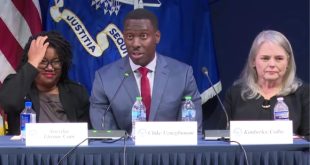 Because immigration enforcement is a federal power, the government has delegated power through the 287(g) program to state and local governments to assist Immigration and Customs Enforcement in arresting and detaining illegal aliens.
Because immigration enforcement is a federal power, the government has delegated power through the 287(g) program to state and local governments to assist Immigration and Customs Enforcement in arresting and detaining illegal aliens.
The House of Representatives last week passed two bills intended to strengthen immigration enforcement and protect Americans.
“Kate’s Law” would increase penalties to illegal aliens who’ve re-entered the country after deportation. The other bill would penalize so-called sanctuary cities and states for refusing to detain illegal aliens.
According to the Daily Signal, more jurisdictions want to become part of the program to help the government protect Americans. An excerpt:
The 287(g) program currently has 45 law enforcement agencies participating in 18 states, and Immigration and Customs Enforcement has trained and certified 1,822 officers.
Of these participating municipalities, 11 of the memorandums of agreement have been signed since the Trump administration assumed office.
While this increase in participation is to be lauded, there is still room for improvement.
The Daily Signal also noted that the Obama administration “frequently rejected and removed” participating jurisdictions, but contended that the federal government should approve all that apply, unless it has “legitimate grounds to refuse them.”
President Donald Trump expanded the 287(g) program in January. From the executive order:
The Secretary, through the Director of U.S. Immigration and Customs Enforcement, shall, to the extent permitted by law and subject to the availability of appropriations, take all appropriate action to hire 10,000 additional immigration officers, who shall complete relevant training and be authorized to perform the law enforcement functions described in section 287 of the INA (8 U.S.C. 1357).
Photo credit: By Jonathan McIntosh – Own work, CC BY 2.5, Link
 CURE News and Clergy Blog News and Commentary for Christians
CURE News and Clergy Blog News and Commentary for Christians



